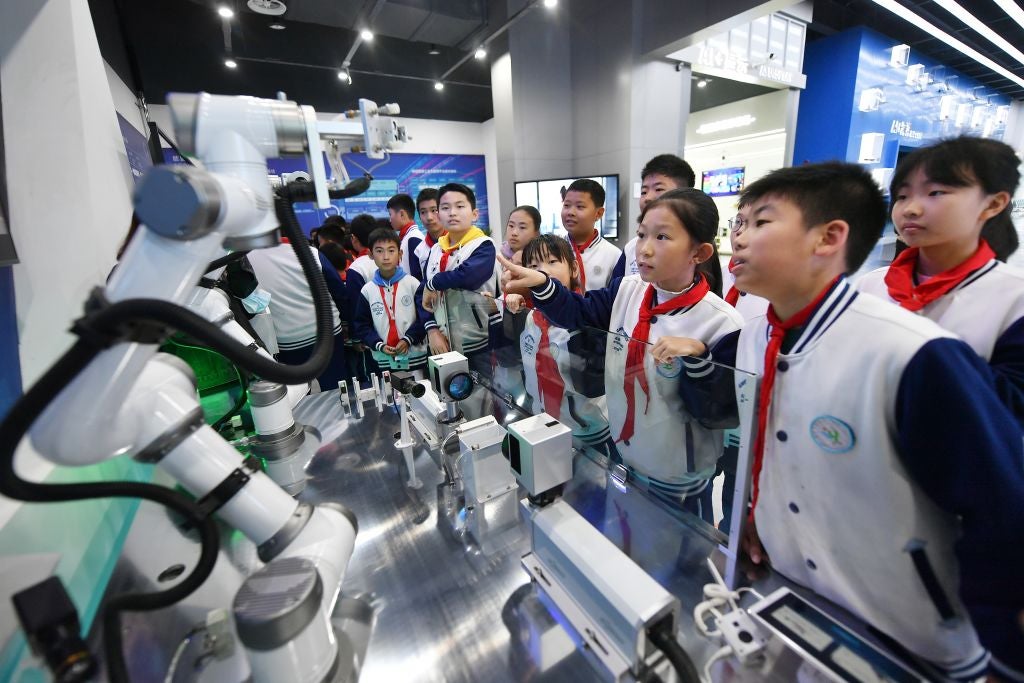
Two of China’s leading artificial intelligence (AI) companies are set to go public in the coming weeks, a potentially landmark moment in the country’s rapid rise to global leadership in AI.
SenseTime and Megvii are expected initial public offerings (IPOs) on the Hong Kong and Shanghai stock exchanges, respectively. Reuters has reported that SenseTime is hoping to raise $2bn (12.78bn yuan) from its IPO.
Both companies have faced criticism for their cooperation with China’s security apparatus. SenseTime’s IPO prospectus recently revealed that nearly half the company’s revenue comes from its Smart City business, which includes the use of facial recognition for surveillance by local governments.
This includes the Xinjiang region, where SenseTime’s facial recognition tools have been used as part of a broader crackdown on Muslim minority groups, earning the company a place on the US sanctions list.
AI patents rise in China
In 2020, Chinese inventors filed almost 21,000 patents relating to AI – a record for the country, putting it in second place behind the US, which had just under 33,000.
Chinese companies have become particularly dominant in the domain of so-called 'smart cities'. Chinese institutions came in the top two places for every task in this year’s AI City Challenge, a prestigious AI competition organised by major companies including NVidia.

US Tariffs are shifting - will you react or anticipate?
Don’t let policy changes catch you off guard. Stay proactive with real-time data and expert analysis.
By GlobalDataWinners included Baidu, Alibaba, Sun Yat-sen University, Shenzhen Institute of Advanced Technology and UCAS.
China’s rapid acceleration of AI innovation is part of the broader expansion of its interest in the sector. Hiring in the AI sector has increased 70% faster in China than the US since 2019, figures from GlobalData show.
US concern at China's AI rise
In September, the Pentagon’s first chief software officer, Nicholas Chaillan, resigned in protest at what he described as the US’s failure to keep up with China’s growing AI capabilities.
“We have no competing fighting chance against China in 15–20 years,” Chaillan told the Financial Times. “Right now, it is already a done deal; it is already over in my opinion.”
Chaillan’s warning came months after the US National Security Commission on Artificial Intelligence reported to Congress that China was on track to “surpass” the US as an AI superpower. “China’s plans, resources and progress should concern all Americans,” the report said. "It is an AI peer in many areas and an AI leader in some applications. We take seriously China’s ambition to surpass the US as the world’s AI leader within a decade.”
Concerns about China’s lax ethical standards may already be starting to bite. OECD figures show that venture capital interest in China has slowed significantly since 2018.
Chinese AI companies aren’t the only ones facing human rights concerns, however. Clearview AI, a US company, has been sued by the ACLU and by immigrants’ rights groups over concerns about its use of face recognition technology for law enforcement.
In his interview with the Financial Times, Chaillan blamed ethical concerns among software developers and regulators for the relatively slow pace of AI development in the US, singling out Google for its reluctance to cooperate with the US government on military projects.
In 2018, Google’s collaboration with the US Department of Defence on Operation Maven was ended due to the organised opposition of the tech company’s employees, who said that the company “should not be in the business of war”. Project Maven would have seen AI used to enhance analysis of images and videos and could have been used to help target drone strikes.
Since then, Google has quietly re-engaged with the Pentagon. The New York Times has revealed that the company is “aggressively pursuing a major contract to provide its technology to the military”. It is unclear whether the project, which would see Google’s cloud capabilities provided for use on the battlefield, would breach the AI ethics guidelines adopted by the company in the wake of the Operation Maven uproar.
This article forms part of GlobalData’s AI week. For other articles in the series, please visit:
- Opinion: AI warfare is coming and businesses need to be prepared – Investment Monitor
- Financial sectors look to AI in site selection – Investment Monitor
- Index shows US is winning the AI race – but for how long? – Investment Monitor
- Weekly data: How China became an AI powerhouse – Investment Monitor
- AI could make oil and gas a little less dirty – Energy Monitor
- AI is coming — and you can take that to the bank – Verdict
- Alibaba-backed institute achieves “another Sputnik moment” in China’s battle for AI supremacy – Verdict
- Japan is leading the way into the elderly-population future. Its solution? AI-powered ‘Society 5.0’ – Verdict
- Why is AI an obsession for business insiders? – Verdict
- Big Tech leads the AI race – but watch out for these six challenger companies – Verdict
- AI in apparel supply chains could force reshoring – Just Style
- By leveraging AI for forecasting, RBC delivers next gen digital advice for Canadians – Retail Banker International
- How is AI impacting the automotive industry? – Just Auto
- Tackling the shipping container crisis with help from AI – Ship Technology
- Canada’s major banks optimise AI to drive growth, enhance customer experience – Retail Banker International
- AION Labs Q&A: driving innovation in pharma AI – Pharmaceutical Technology
- AI in healthcare: key highlights in 2021 – Pharmaceutical Technology
- Antibiotic resistance: how AI can tackle the superbug threat – Pharmaceutical Technology
- Cyberwarfare: does UK defence make the grade? – Army Technology



